The dog training industry offers an abundance of opportunities for prospective trainers. As our recent study showed, full-time dog trainers earn average salaries in excess of $60,000, with even part-time trainers able to make a good living with schedule flexibility.
If you dream of becoming a professional dog trainer, one of the best ways to learn is from those who are already in the industry. What have their experiences taught them? How have they found success? What advice would they offer to individuals considering a career in dog training?
Our Graduate Showcase series features dog trainers who have graduated from one of the programs at the School for Dog Trainers, and then gone on to start a successful business of their own.
In this article, our focus is on Steve Rigden and Taipei Dog Training. Originally from the United Kingdom, Rigden studied at the School for Dog Trainers in 2012, before heading to Taiwan to launch his dog training business.
We asked about Rigden’s experiences with dogs growing up in the UK, how he found out about Highland Canine, and the differences in dog training culture between the UK, the US and Taiwan.

Please tell us a little bit about your business, Taipei Dog Training, and the services it offers.
Taipei Dog Training offers quite a range of services – but 95% of the work for me is behavior modification. That was never intended – it is just how it worked out. I offer one-to-one lessons in basic to advanced obedience, behavior modification. I also offer lessons in agility and scent work. There’s plenty of ‘interest’ in these, but little actual uptake. We also get asked to offer dog walking services on occasion, but it’s not something we actively look for.
I was approached to help train the New Taipei Police K9 team after they saw a demonstration of my dog doing scent work. I worked with them for a year, which was interesting. This led to me being invited to train the new Coast Guard K9 team, but I turned that down. I also teach local shelter staff about canine body language body and bite prevention.
I worked on two seasons of Cesar Millan’s show, Cesar’s Recruit: Asia. This was useful for advertising – as well as teaching me that I had zero interest in working in TV ever.
Could you let us know a little bit about your background with dogs? Your website says you were training dogs back in the 1980s in the UK?
When I was about 12 years old, I really wanted a dog. My family had always had dogs, but our last one had passed away years before and I really wanted one of my own. My father actively didn’t want one as he anticipated my interest would wane and he’d be left with all the walking etc.
Because of this, I started walking neighbors’ dogs. This evolved into my first business, and in hindsight, I was ripped off. One neighbor had a large liver and tan dobermann called Max who dragged his owners around the town. It was jokingly suggested I offer my services to them. So I knocked on their door, and all hell broke loose – Max attempted to smash the door off its hinges. The owner opened the door, holding Max’s collar as he went crazy. She said I could walk him, so I waited outside her garden as she got him ready. Max dragged her over to me, gasping as his choke chain tightened. He had zero leash manners and he dragged the entire time. Each time I went to the house, it was always the same.
I don’t know who suggested it, but one day, I took biscuits with me. As I knocked the door, the usual ritual started, the owner opened the door and Max was going berserk as usual. I decided to throw a biscuit – silence. I asked Max to sit, and he did. Over the next few months I would knock and say, “Max, it’s me”, and he would cry and whine waiting for his walk.
I read books on dog training, and got Max to walk well to heel. Eventually, I got him off leash. My Dad drove past his owner being dragged by Max, and was suitably impressed that he didn’t do that to me. In a weak moment, he agreed I could have a dog. I got a Staffy, and all my time went to him. Now that Max’s owner needed to walk their own dog more often, they asked me to teach them how to walk him – and that was my first training client.
I saw an agility competition on TV and decided my Staffy would do this. I made a rudimentary course and started his training. It wasn’t an impressive course, but it still drew attention, and people asked if their dogs could have a go. So for the next four years – until I left home – I trained many of my neighbor’s dogs to walk nicely, sit and stay, or to jump over my obstacles.
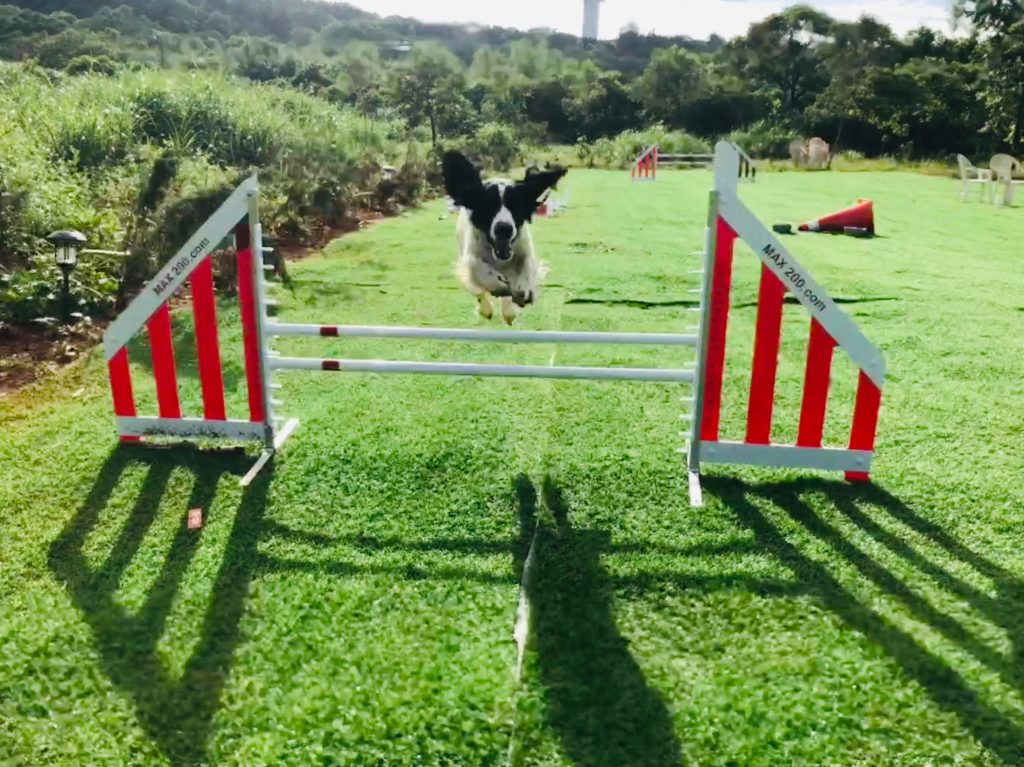
How did things progress after you left home?
I moved to London at 18, and not knowing many people and not having a dog, I volunteered at Battersea Dogs Home as a dog walker. This actually coincided with the banning of Pitbulls in the UK, so Staffys and Pitbulls were surrendered in alarming numbers. Lots of people were afraid of them because of the media frenzy, but they were my favorites. The Staffys could not be rehomed if they demonstrated any aggression towards other dogs and would therefore be euthanized (I think this is still the case today).
So I used to try and encourage them to not be aggressive. I didn’t have any real knowledge of behavior modification, but nobody else was doing anything for them. I won’t claim a great success rate but some responded to my methods.
I did this until i went to University as a mature student. When I graduated as a radiographer, I got a six month placement in Bosnia with the Army. If I say I did 20 X-Rays in that time, I’d be exaggerating. I had time on my hands. In the mess one night, I was sat next to an MP dog handler and we chatted. I was invited to come and see the dogs the next day. I was shown the Spaniels searching and then got the dubious opportunity to face down the Shepherds. I was given a sleeve, and then a chequered red and white shirt – the kind a lumberjack is meant to wear. I asked why the left arm on the shirt was all chewed up as well. “Dont worry about that,” was the reply.
I was flattened repeatedly by different German Shepherds and a Malinois, always making sure my right arm was clearly available. I did this for the entire tour, and when I left with the money I had saved, I got an American Bulldog. It seemed the perfect combination of a Staffy-type dog and a dog I could do dog sports with.
It transpired that I had a couple of issues with him. I contacted a behaviorist and was amazed how quickly these problems were fixed. I started reading more and more about the behavior side of dog training too. I got more dogs myself and offered training classes. I took my own dogs to agility classes and most of my spare time outside of work revolved around dogs.
How did you first hear about Highland Canine/School for Dog Trainers?
In 2012, my wife and I decided to move to Taiwan (where she is originally from). I couldn’t work as a radiographer in Taiwan because of the language barrier. So in 2012, I started dog training full-time. I was confident and got good results, but I didn’t feel like I was a real trainer. The UK doesn’t have schools like the School for Dog Trainers where you can go and study for 3-6 months. I was unaware they even existed. I had done many weekend seminars with trainers in the UK. But the discovery that I could do it full time came about by chance when I was browsing online. I came across a picture tagged with International School for Dog Trainers.
Now that I was aware of them, I looked at other schools. I spoke to a dog trainer friend of mine in the UK and asked him if he could give any suggestions on schools to go to. He was a Metropolitan police handler and recommended Highland to me.
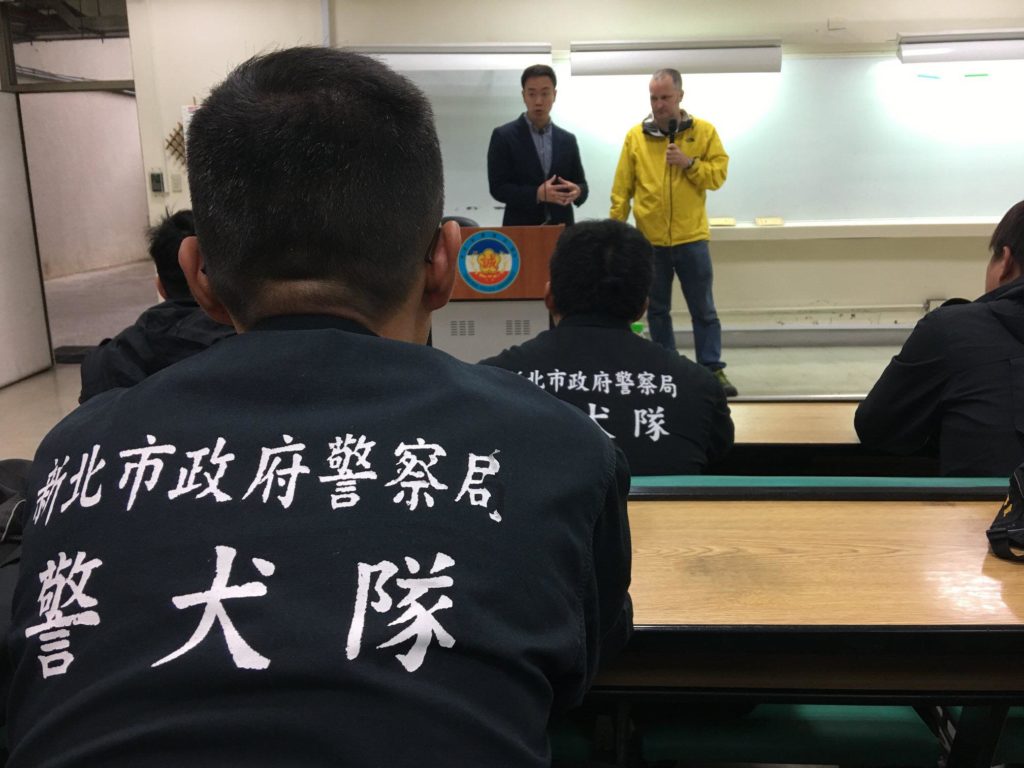
Can you provide some insight into how your education at the School for Dog Trainers helped you with running your own business? How do you use what you learned in your day-to-day business activities?
I definitely wouldn’t have been doing as well as I have if I hadn’t gone to the School for Dog Trainers. The course gave me structure and background understanding to things I was already doing, but also taught me a lot more. My biggest regret was not doing the Master Dog Trainer course, as at the time, I felt most of the stuff there wouldn’t be of use to me here in Taiwan, but it really would have.
I’d recommend to anyone choosing a course to go ahead and do it – you never know what opportunities will become available in the future for you, and the Master Dog Trainer course will almost certainly leave you equipped. That said, my course was excellent. I liked how it taught you to understand dog training, rather than just teaching how to teach certain things. It definitely leaves you able to learn new things on your own.
The ‘Business Week’ was one aspect I found really useful. I had no knowledge of how to use the internet or SEO etc., but I’m ranked number one on Google. But the main thing Highland did for me was raise the bar in what I felt was possible. Prior to attending, I had no goals bigger than a group class – that’s not the case any more.
What is your favorite aspect of running your own business?
I work seven days a week – but I’m doing something I really enjoy. When I was working in the hospitals, I was stuck inside all day on long, long shifts. Now, I’m outside with dogs.
I meet a lot of people from all walks of life. There are two main things I enjoy the most – the first is not having a boss to answer to, and the second is having goals and dreams for how to build my business.

You were born in the UK, studied in the US, and now live in Taiwan. Have you noticed any major differences in public attitudes towards dogs in each place?
This is an interesting question. In Taiwan, there are dog grooming salons everywhere – literally on the road I live on, there are three salons in less than 1.5km. Dogs go around in strollers. Seeing a dog in human-style clothes is not a shock anymore. This is how purebred dogs like a Poodle or a Bichon are raised here.
By contrast, if you walk the riverside parks or go into the countryside, there are packs of feral dogs. Seeing a three-legged dog with a trap hanging off a mangled foot is not a rare sight. We have over a million street dogs here. The shelters don’t euthanize dogs, so they are overcrowded. There are many private shelters and these are all funded by donations, and there are some of the most generous people in Taiwan giving a large proportion of their salary to support these dogs. Little old ladies live in the mountains and they care for hundreds of dogs. Others drive around feeding street dogs.
So there is definitely a chasm between the lives of a pampered purebred and the many street dogs. But I’m constantly left in awe at how generous some people are here in helping strays.
Are there differences in dog training philosophies between the US, the UK and Taiwan?
Training is a whole different thing. First off, the base knowledge of dogs here in Taiwan is just not there. The average person just doesn’t know as much about dogs as we do in the UK or USA. I got caught out a lot when I was training people here at first because I assumed people would know certain things. I now assume they know nothing and go from there.
For example, I was once asked by a relative for help with their dog – it was peeing all over their house. My Chinese was minimal back then, and when I asked how often they took it out and they replied “once a week”, I assumed my Chinese was playing up and they were saying once a day. So I said, “Once a day isn’t enough – it needs to go out to pee at least 4 times.” My wife was giving me this wide-eyed, ‘oh my god’ look, and she said, “No – they said once a week.” I suggested we go back to their house and they both go and use the bathroom – I would then lock the bathroom and come back in a week and see how they got on.
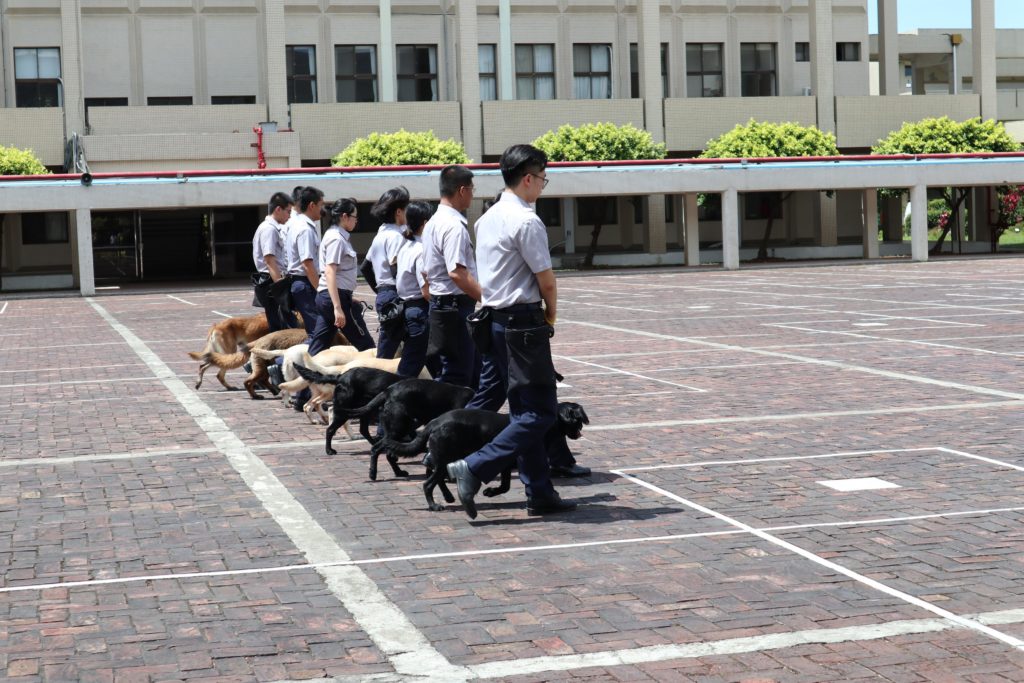
I’d say 99% of pet dog trainers here are purely positive trainers, and the majority of them are trained by the same teacher. There are some very good IPO trainers here, but as far as I know, they don’t do much with pets. I’ve probably just answered why I get mainly behavior modification clients.
I think the USA has far, far more options for learning about training or doing things with your dogs. Barn hunt, for example – if I did that here, I would be on TV as an animal abuser with cartoons of dogs mauling rats. But because people do more with their dogs in the USA, more opportunities become available. The idea that a dog can have activities that the owner can do with them is already in the consciousness.
In Taiwan, I still try to get people to do agility or scent work, but the concept of doing training as an ongoing pastime is not really accepted here. But I shall persevere.
The UK is behind the USA. There are more and more dog clubs, but the choice is not there. I think the way dogs are treated is about the same. There has been a shift in the UK to purely positive training too, but not to the extent of Taiwan. A dog’s basic needs are viewed in the same way in both countries. The UK doesn’t have the hunting dogs that the USA has, and the hunting of animals with dogs is illegal in the UK. But I think on the whole, dogs are treated similarly. Perhaps the biggest difference is dogs being chained up and sleeping outside never happens in the UK, but that’s probably the weather.
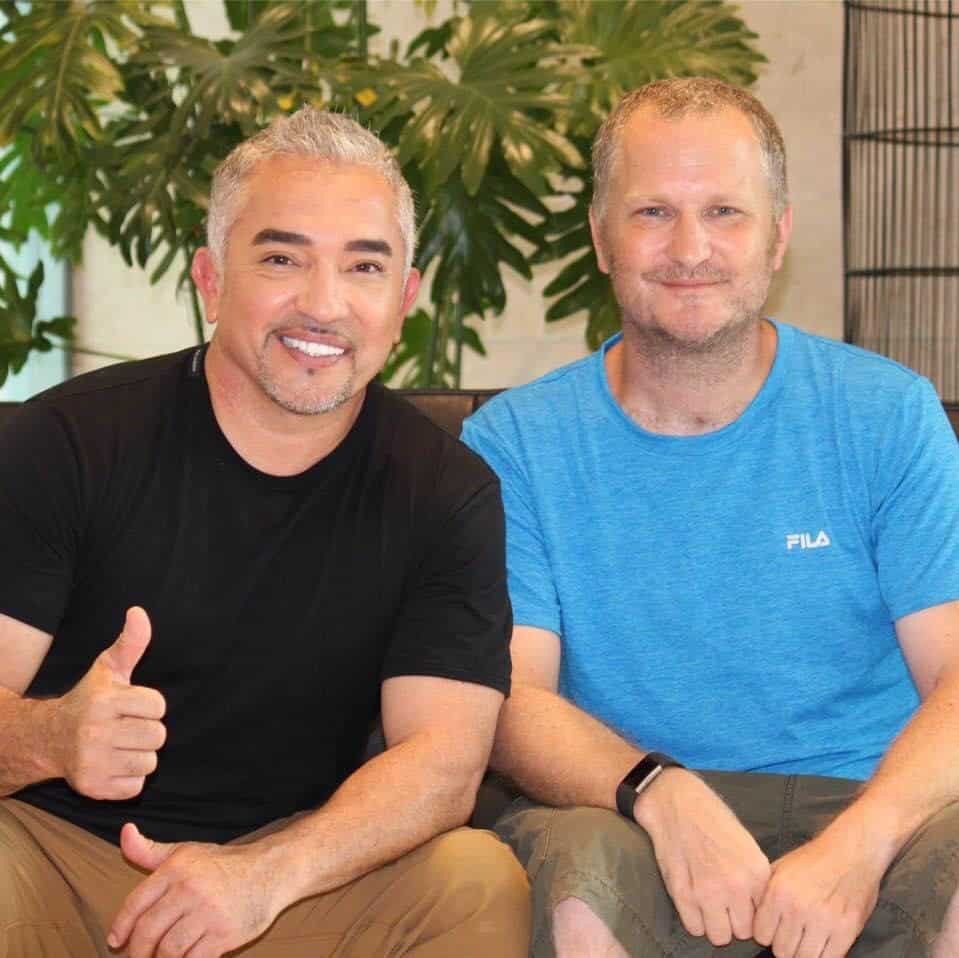
What are your future aspirations for Taipei Dog Training?
Well, I get asked to teach people to be trainers fairly regularly, so I’d like to combine that with the shelters here. I hope to get gap year students to come to Taiwan and learn dog training using shelter dogs. Hopefully it would improve the dog’s chances of getting adopted, in addition to raising some money for the shelters. But it would also send home some advocates for the plight of dogs in Asia. This is still in the imagination phase because I work alone, but that’s a goal.
I also want to tap into the online class market. The Chinese market is huge, so right now I’m focusing on that, getting footage together and developing a course or two. I think they are my viable dreams. I’d love to get people doing more with their dogs here, but it’s hard.
I also have my own range of treats and toys. I make leashes and collars and also buy some from factories. I sell these online and to customers – this is doing well and gives me some flexibility to focus on developing my online lessons.
—
To learn more about Taipei Dog Training, visit their website or follow their latest updates on Facebook or Instagram.

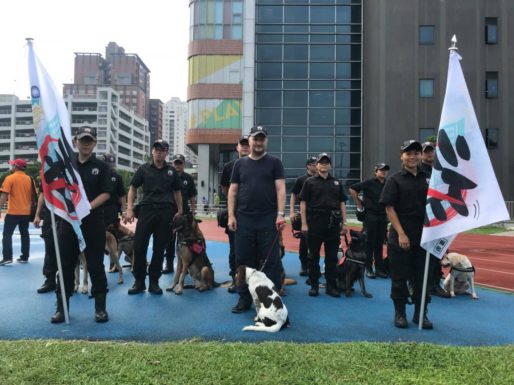
One Reply on “Graduate Showcase: Steve Rigden & Taipei Dog Training”
Comments are closed.